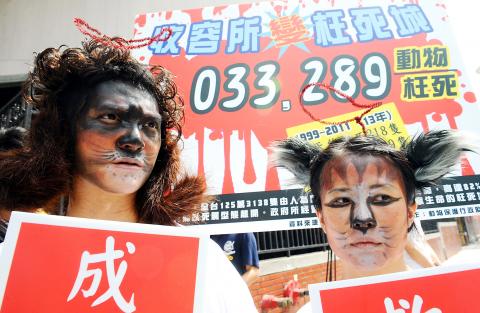More than 1.25 million stray animals have been caught and put into public animal shelters during the past 13 years, but as much as 82 percent of them have been put to death or died in the shelters because of insufficient regulations, animal rights activists said at a demonstration in Taipei yesterday.
“Please help us, we are dying as victims of injustice,” shouted two activists in costumes, mimicking a cat and a dog, crawling on their knees and eventually lying flat on the ground, symbolizing the mistreatment of stray animals in animal shelters.
The Life Conservationist Association’s Monitoring Committee for Animal Protection executive director Ho Tsung-hsun (何宗勳) said according to statistics from animal shelters, at least 1,253,138 stray animals have been put into public animal shelters in the past 13 years, but the majority of them have died in these “cities of innocent deaths.”

Photo: Chang Chia-ming, Taipei Times
The insufficient regulations based on the Animal Protection Act (動物保護法) of 1998 have led to the innocent deaths of many stray animals, Ho said.
“People can randomly report an animal they see on the streets and the government will go capture it … which has led to many misreported cases and caused tragedies to the reported pets,” he said.
The activists made a list of the local public animal shelters with the most animal deaths between 2008 and last year, in which New Taipei City (新北市) ranked first with 68,766 animals in its care, of which 51,133 animals died. Of these, 36,703 animals were put to death and 14,430 died in the shelter.
The government spends about NT$200 million a year on taking the lives of tens of thousands of stray animals, but trying to solve the problem of stray animals by only using up euthanasia budgets every year is not effective, Animals Taiwan executive director Peter Pan (潘樹渝) said, adding that methods involving community efforts should be applied.
The activists urged that loopholes in existing regulations be amended and that the public administrations in charge of animal protection should be monitored by the people. This would ensure that several goals are achieved, such as raising the number of animal captures, expanding lifetime sheltering programs and promoting neutering of pets.

Three Taiwanese airlines have prohibited passengers from packing Bluetooth earbuds and their charger cases in checked luggage. EVA Air and Uni Air said that Bluetooth earbuds and charger cases are categorized as portable electronic devices, which should be switched off if they are placed in checked luggage based on international aviation safety regulations. They must not be in standby or sleep mode. However, as charging would continue when earbuds are placed in the charger cases, which would contravene international aviation regulations, their cases must be carried as hand luggage, they said. Tigerair Taiwan said that earbud charger cases are equipped

Foreign travelers entering Taiwan on a short layover via Taiwan Taoyuan International Airport are receiving NT$600 gift vouchers from yesterday, the Tourism Administration said, adding that it hopes the incentive would boost tourism consumption at the airport. The program, which allows travelers holding non-Taiwan passports who enter the country during a layover of up to 24 hours to claim a voucher, aims to promote attractions at the airport, the agency said in a statement on Friday. To participate, travelers must sign up on the campaign Web site, the agency said. They can then present their passport and boarding pass for their connecting international

Temperatures in northern Taiwan are forecast to reach as high as 30°C today, as an ongoing northeasterly seasonal wind system weakens, the Central Weather Administration (CWA) said. CWA forecaster Tseng Chao-cheng (曾昭誠) said yesterday that with the seasonal wind system weakening, warmer easterly winds would boost the temperature today. Daytime temperatures in northern Taiwan and Yilan County are expected to range from 28°C to 30°C today, up about 3°C from yesterday, Tseng said. According to the CWA, temperature highs in central and southern Taiwan could stay stable. However, the weather is expected to turn cooler starting tonight as the northeasterly wind system strengthens again

Taiwan sweltered through its hottest October on record, the Central Weather Administration (CWA) said yesterday, the latest in a string of global temperature records. The main island endured its highest average temperature since 1950, CWA forecaster Liu Pei-teng said. Temperatures the world over have soared in recent years as human-induced climate change contributes to ever more erratic weather patterns. Taiwan’s average temperature was 27.381°C as of Thursday, Liu said. Liu said the average could slip 0.1°C by the end of yesterday, but it would still be higher than the previous record of 27.009°C in 2016. "The temperature only started lowering around Oct. 18 or 19